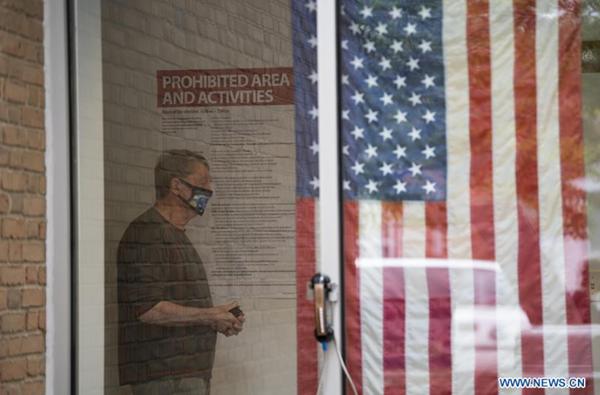

"There are two things that are important in (U.S.) politics. The first is money, and I can't remember what the second one is," said Mark Hanna, former U.S. Senator from Ohio, in 1895. Sadly, this still holds true for the U.S. today.

A man waits to vote during the in-person early voting for U.S. president in Alexandria, Virginia, the United States, on Sept. 18, 2020. (Xinhua/Liu Jie)
The 2020 election is a perfect reflection of money politics in the U.S. Data from the Center for Responsive Politics (CRP), a non-profit, nonpartisan research group in the U.S., suggests that the total cost of this year’s elections, including presidential and congressional, will near $14 billion.
The 2020 presidential election is set to cost over $6.6 billion, while donations made to the race for congressional seats will top $7.2 billion, according to the CRP.
With the U.S. still in the grip of the COVID-19 epidemic, the two presidential candidates have invested large sums of money in media campaigns such as TV commercials. By Oct. 19, both sides had already spent $1.5 billion on advertising.
Since money decides the votes, it is inevitable from the beginning of the election that the U.S. government becomes the spokesperson of the rich.
Large companies and special interest groups have put in large amounts of money into the U.S. election, waiting for the "seed players" to return the favor after they come to power, Russian news agency Sputnik observed.
"We had a hierarchy in my office in Congress," said then Director of the Office of Management & Budget Mick Mulvaney in 2018. "If you were a lobbyist who never gave us money, I didn't talk to you. If you were a lobbyist who gave us money, I might talk to you."
By the end of August, 2.8 million people, or 0.86 percent of the U.S. population, had contributed an average of $200 or more to this year's federal elections, providing almost 74 percent of all campaign funds.
An even smaller number, 44,000 people, had given $10,000 or more each to this election, coming to nearly $2.3 billion.
And 2,635 people – about 0.0001 percent of the U.S. population – together provided $1.4 billion.
The private dollars that fuel U.S. elections come mostly from a tiny fraction of society. Critics of American inequality often talk about "the 1 percent" — but in campaign finance it is the 0.0001 percent who matter, according to an article published by Richard Briffault, a law professor at the Columbia University in the City of New York on The Conversation, a network of not-for-profit media outlets.
"Having a small number of very wealthy individuals financing political candidates distorts the political process. This is less a classical quid pro quo–the exchange of campaign dollars for votes–than it is politicians' reluctance to take positions that are at odds with the interests of their large donors. What gets on–or stays off–the legislative agenda can be driven by donor concerns," Briffault noted.
In American politics, the interests of a small number of people seem to outweigh the interests of 99.999 percent of ordinary people, including more than 200,000 lives lost due to the pandemic and 30 million civilians without medical insurance. This is the absurdity of money politics that cannot be changed by the 2020 U.S. election.
 Fire brigade in Shanghai holds group wedding
Fire brigade in Shanghai holds group wedding Tourists enjoy ice sculptures in Datan Town, north China
Tourists enjoy ice sculptures in Datan Town, north China Sunset scenery of Dayan Pagoda in Xi'an
Sunset scenery of Dayan Pagoda in Xi'an Tourists have fun at scenic spot in Nanlong Town, NW China
Tourists have fun at scenic spot in Nanlong Town, NW China Harbin attracts tourists by making best use of ice in winter
Harbin attracts tourists by making best use of ice in winter In pics: FIS Alpine Ski Women's World Cup Slalom
In pics: FIS Alpine Ski Women's World Cup Slalom Black-necked cranes rest at reservoir in Lhunzhub County, Lhasa
Black-necked cranes rest at reservoir in Lhunzhub County, Lhasa China's FAST telescope will be available to foreign scientists in April
China's FAST telescope will be available to foreign scientists in April "She power" plays indispensable role in poverty alleviation
"She power" plays indispensable role in poverty alleviation Top 10 world news events of People's Daily in 2020
Top 10 world news events of People's Daily in 2020 Top 10 China news events of People's Daily in 2020
Top 10 China news events of People's Daily in 2020 Top 10 media buzzwords of 2020
Top 10 media buzzwords of 2020 Year-ender:10 major tourism stories of 2020
Year-ender:10 major tourism stories of 2020 No interference in Venezuelan issues
No interference in Venezuelan issues
 Biz prepares for trade spat
Biz prepares for trade spat
 Broadcasting Continent
Broadcasting Continent Australia wins Chinese CEOs as US loses
Australia wins Chinese CEOs as US loses